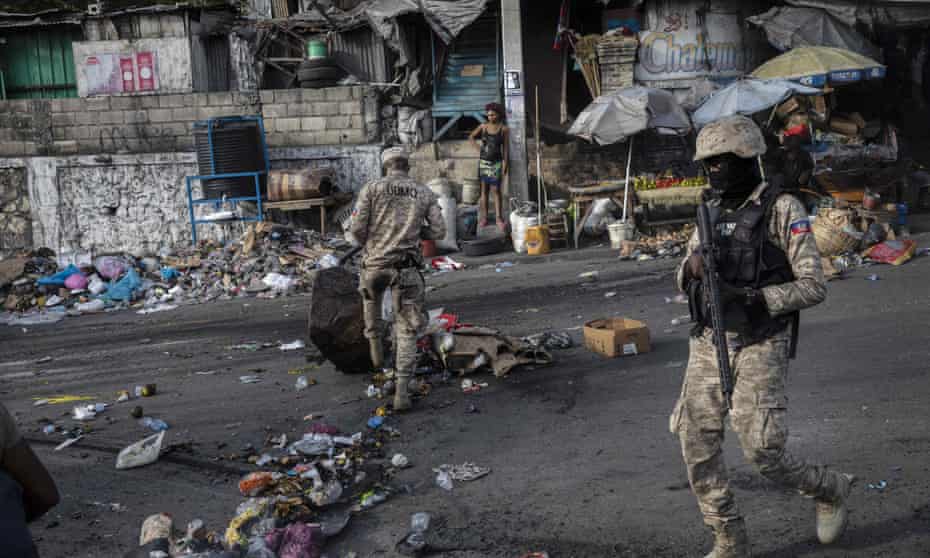Five children were among group of 16 US citizens and one Canadian abducted by gang members after orphanage visit

A group of 17 missionaries, including five children, have been kidnapped by an armed criminal gang in Haiti.
The group – 16 Americans and one Canadian citizen – were on their way home from building an orphanage, according to a statement from the Ohio-based Christian Aid Ministries, which supports 9,000 children in Haitian schools and sent out a message asking supporters to pray for its members.
The statement said the mission’s field director was working with the US embassy, and that the field director’s family and one other unidentified man had stayed at the mission’s base while everyone else visited the orphanage.
The kidnapping occurred between 8am and 10am on Saturday morning while some of the missionaries were travelling to Port-au-Prince’s Toussaint Louverture airport to return home.
According to the Washington Post, one of the abducted Americans managed to send a message on WhatsApp calling for help as the kidnapping took place. “Please pray for us!! We are being held hostage, they kidnapped our driver. Pray pray pray. We don’t know where they are taking us.”
The kidnapped missionaries, some of whom were on their first visit to Haiti, were reportedly returning on Route 8 from the area of Ganthier, east of the capital, when they were stopped by heavily armed men who had set up road blocks near the Boen crossroads and in La Tremblay 17. As well as the five children, the group comprised seven women and five men.
The area in which they were seized is the territory of the 400 Mawozo criminal gang, which has been blamed for previous kidnappings earlier this year including those of a priest and a French nun in April.
The 400 Mawozo gang, based around Ganthier on Lake Azuei, has a history of targeting religious groups and has more recently begun more large-scale kidnappings employing barricades on well-travelled roads to scoop up any passersby in the cars and buses that they stop.
According to Gédéon Jean, the director of the Center for Analysis and Research in Human Rights in Port-au-Prince, those captured appeared to be 16 Americans and one Canadian citizen.
A US government spokesperson said they were aware of the reports about the kidnapping. “The welfare and safety of US citizens abroad is one of the highest priorities of the Department of State,” the spokesperson said, declining to comment further.
Haiti – which currently has the worst global record for kidnapping – has been struggling with a sharp increase in the gang-related crimes that had diminished after the president, Jovenel Moise, was fatally shot at his private residence on 7 July, and after a 7.2-magnitude earthquake struck south-west Haiti in August and killed more than 2,200 people.
Gangs have demanded ransoms ranging from a couple of hundred dollars to more than $1m, according to authorities.
Last month a deacon was killed in front of a church in Port-au-Prince and his wife kidnapped, one of dozens of people who have been abducted in recent months.
At least 328 kidnapping victims were reported to Haiti’s police in the first eight months of 2021, compared with a total of 234 for all of 2020, according to a report issued last month by the United Nations Integrated Office in Haiti, known as BINUH.
Gangs have been accused of kidnapping schoolchildren, doctors, police officers, busloads of passengers and others. In April, one gang kidnapped five priests and two nuns, a move that prompted a protest similar to the one organised for this Monday to decry the impoverished country’s lack of security.
“Political turmoil, the surge in gang violence, deteriorating socioeconomic conditions, including food insecurity and malnutrition, all contribute to the worsening of the humanitarian situation,” BINUH said in its report. “An overstretched and under-resourced police force alone cannot address the security ills of Haiti.”
The kidnapping of the missionaries comes just days after high-level US officials visited Haiti and promised more resources for the country’s police force, including another $15m (£11m) to help reduce gang violence, which this year has displaced thousands of Haitians who now live in temporary shelters in increasingly unhygienic conditions.
Among those who met with Haiti’s police chief was Uzra Zeya, the US undersecretary of state for civilian security, democracy, and human rights. “Dismantling violent gangs is vital to Haitian stability and citizen security,” she recently tweeted.
While the kidnapping of such a large group of foreigners is unusual, the epidemic of kidnapping in Haiti has become increasingly commonplace and brazen. Both rich and poor have been targeted and children have been snatched on the way to school as gangs, many with political connections, have extended their stranglehold on Haitian life again.
Agencies contributed to this story

Leave A Comment